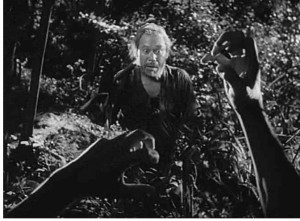From the May 2018 issue of Journal of Chinese Cinemas. — J.R.
XD: Jonathan, you and I are both cinephiles. Much of our conversation over the years has been about our favorite films and directors, and we nudge each other to watch or re-watch new releases and rediscovered classics. Now that we’re co-editing this special issue on comedy, I wonder, what are some of the most amusing moments for you in the Chinese-language films that you’ve seen? I ask about these cinephiliac moments because when a comic scene works, it tends to be highly memorable. And often what we find amusing can tell us a lot about the film as a whole: how it plays with comic conventions, how it addresses its audience, how it ages over time.
JR: I was especially amused by the point-of-view shots from inside an ATM in Peter Chan’s 1996 Comrades: Almost a Love Story (a particular favorite of mine), because of the whole idea of what we look like from the vantage point of our money – or, more specifically, what Maggie Cheung and Leon Lai, both mainlanders who meet one another in Hong Kong and try to “make it” there, look like to the ups and downs of their cash balances that epitomize much of their struggle. Read more
From Movies of the Fifties, edited by Ann Lloyd (London: Orbis Publishing, 1982). Prior to this, it was published in one of the “chapters” of The Movie in 1981 or 1982, but I’m no longer clear about which one. — J.R.


For two centuries, Japan chose to isolate itself from the rest of the world. Then, in 1894, the American Commodore Perry sailed into Tokyo Bay and ‘rediscovered’ the Japanese islands. Yet nothing was known about Japanese cinema in the West for almost another century. The difference was that whereas Perry had come upon a country that appeared technologically backward, the west encountered a cinema that was, on the evidence of the films that began to be shown in the Fifties, every bit as advanced as its own.
By and large western recognition and appreciation of Japanese films can be said to have dated from the appearance of key movies at the Venice and Cannes Film Festivals.Akira Kurosawa’s Rashomon (1950) won the Golden Lion at Venice in 1951 and the same honor was bestowed upon four films by Kenji Mizoguchi in the succeeding years. The films were: Saikaku Ichidai Onna (1952, The Life of Oharu),Ugetsu Monogatari (1953, Tales of the Pale and Silvery Moon After the Rain), Sansho Dayu (1954, Sansho the Bailiff ) and Yokihi (1955, The Empress Yang Kwei-Fei). Read more
Here is a chronological list of many of the book reviews and longer pieces on literary and related subjects found on this web site, with links added in a few cases; capsule reviews of films are omitted, and this list is otherwise far from complete, especially regarding many more recent posts:
Review of A MOVEABLE FEAST (Bard Observer, September 1964)
Review of THE CRYING OF LOT 49 (Bard Observer, May 1966)
“I Missed It at the Movies: Objections to ‘Raising KANE’” (Film Comment, Spring 1972)
Review of JEAN RENOIR: THE WORLD OF HIS FILMS (Film Comment, January-February 1973)
Review of GRAVITY’S RAINBOW (Village Voice, March 1973)
“Raymond Durgnat” (Film Comment, May-June 1973)
Review of Dwight Macdonald’s DISCRIMINATIONS (Village Voice, Oct. 1974)
Review of Gore Vidal’s MYRON (Village Voice, Nov. 1974)
Review of Noel Burch’s THEORY OF FILM PRACTICE (Sight and Sound, Winter 1974/75)
On Jean Renoir [book review] (Film Comment, May-June 1976)
“Film Writing Degree Zero: The Marketplace and the University” (Sight and Sound, Autumn 1977)
Review of Noel Burch’s TO THE DISTANT OBSERVER (American Film, July-August 1979)
Review of Graham Greene’s DR. Read more


